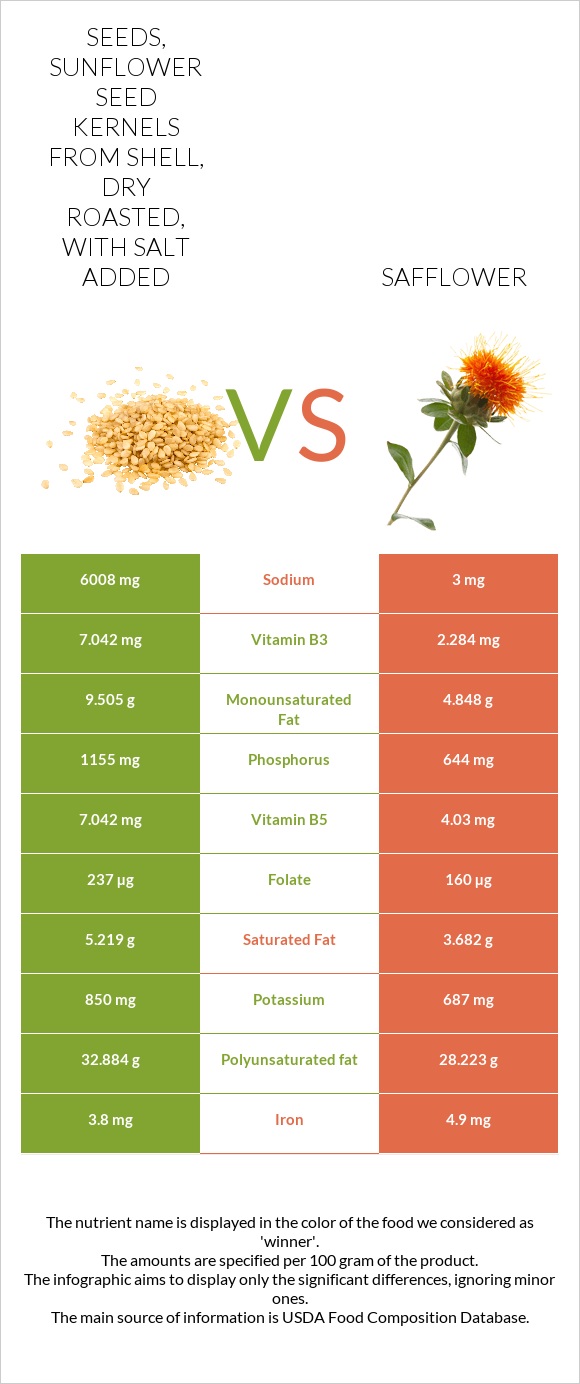Seeds, sunflower seed kernels from shell, dry roasted, with salt added vs. Safflower — In-Depth Nutrition Comparison
Compare
What are the differences between seeds, sunflower seed kernels from shell, dry roasted, with salt added and safflower?
- Seeds, sunflower seed kernels from shell, dry roasted, with salt added is higher in phosphorus, vitamin B5, vitamin B3, and folate, yet safflower is higher in vitamin B1, magnesium, vitamin B6, iron, and vitamin B2.
- Seeds, sunflower seed kernels from shell, dry roasted, with salt added's daily need coverage for sodium is 261% more.
- Seeds, sunflower seed kernels from shell, dry roasted, with salt added has 3 times more vitamin B3 than safflower. While seeds, sunflower seed kernels from shell, dry roasted, with salt added has 7.042mg of vitamin B3, safflower has only 2.284mg.
- The amount of sodium in safflower is lower.
We used Seeds, sunflower seed kernels from shell, dry roasted, with salt added and Seeds, safflower seed kernels, dried types in this article.
Infographic

Infographic link
Mineral Comparison
Mineral comparison score is based on the number of minerals by which one or the other food is richer. The "coverage" charts below show how much of the daily needs can be covered by 300 grams of the food.
| Contains more PotassiumPotassium | +23.7% |
| Contains more PhosphorusPhosphorus | +79.3% |
| Contains more SeleniumSelenium | +∞% |
| Contains more MagnesiumMagnesium | +173.6% |
| Contains more CalciumCalcium | +11.4% |
| Contains more IronIron | +28.9% |
| Contains less SodiumSodium | -100% |
Vitamin Comparison
Vitamin comparison score is based on the number of vitamins by which one or the other food is richer. The "coverage" charts below show how much of the daily needs can be covered by 300 grams of the food.
| Contains more Vitamin CVitamin C | +∞% |
| Contains more Vitamin EVitamin E | +∞% |
| Contains more Vitamin B3Vitamin B3 | +208.3% |
| Contains more Vitamin B5Vitamin B5 | +74.7% |
| Contains more Vitamin KVitamin K | +∞% |
| Contains more FolateFolate | +48.1% |
| Contains more Vitamin AVitamin A | +∞% |
| Contains more Vitamin B1Vitamin B1 | +997.2% |
| Contains more Vitamin B2Vitamin B2 | +68.7% |
| Contains more Vitamin B6Vitamin B6 | +45.5% |
All nutrients comparison - raw data values
| Nutrient |  |
 |
DV% diff. |
| Sodium | 6008mg | 3mg | 261% |
| Vitamin E | 26.1mg | 174% | |
| Selenium | 79.3µg | 144% | |
| Vitamin B1 | 0.106mg | 1.163mg | 88% |
| Phosphorus | 1155mg | 644mg | 73% |
| Vitamin B5 | 7.042mg | 4.03mg | 60% |
| Magnesium | 129mg | 353mg | 53% |
| Fiber | 9g | 36% | |
| Polyunsaturated fat | 32.884g | 28.223g | 31% |
| Vitamin B3 | 7.042mg | 2.284mg | 30% |
| Vitamin B6 | 0.804mg | 1.17mg | 28% |
| Folate | 237µg | 160µg | 19% |
| Fats | 49.8g | 38.45g | 17% |
| Iron | 3.8mg | 4.9mg | 14% |
| Vitamin B2 | 0.246mg | 0.415mg | 13% |
| Monounsaturated fat | 9.505g | 4.848g | 12% |
| Choline | 55.1mg | 10% | |
| Copper | 1.83mg | 1.747mg | 9% |
| Saturated fat | 5.219g | 3.682g | 7% |
| Protein | 19.33g | 16.18g | 6% |
| Carbs | 15.31g | 34.29g | 6% |
| Potassium | 850mg | 687mg | 5% |
| Manganese | 2.11mg | 2.014mg | 4% |
| Vitamin C | 1.4mg | 0mg | 2% |
| Zinc | 5.29mg | 5.05mg | 2% |
| Vitamin K | 2.7µg | 2% | |
| Calories | 546kcal | 517kcal | 1% |
| Calcium | 70mg | 78mg | 1% |
| Net carbs | 6.31g | 34.29g | N/A |
| Sugar | 2.73g | N/A | |
| Vitamin A | 0µg | 3µg | 0% |
| Tryptophan | 0.295mg | 0.183mg | 0% |
| Threonine | 0.788mg | 0.586mg | 0% |
| Isoleucine | 0.967mg | 0.717mg | 0% |
| Leucine | 1.408mg | 1.154mg | 0% |
| Lysine | 0.795mg | 0.534mg | 0% |
| Methionine | 0.42mg | 0.284mg | 0% |
| Phenylalanine | 0.992mg | 0.806mg | 0% |
| Valine | 1.116mg | 1.025mg | 0% |
| Histidine | 0.536mg | 0.452mg | 0% |
Macronutrient Comparison
Macronutrient breakdown side-by-side comparison
Protein:
19.33 g
Fats:
49.8 g
Carbs:
15.31 g
Water:
1.2 g
Other:
14.36 g
Protein:
16.18 g
Fats:
38.45 g
Carbs:
34.29 g
Water:
5.62 g
Other:
5.46 g
| Contains more ProteinProtein | +19.5% |
| Contains more FatsFats | +29.5% |
| Contains more OtherOther | +163% |
| Contains more CarbsCarbs | +124% |
| Contains more WaterWater | +368.3% |
Fat Type Comparison
Fat type breakdown side-by-side comparison
Saturated fat:
Sat. Fat
5.219 g
Monounsaturated fat:
Mono. Fat
9.505 g
Polyunsaturated fat:
Poly. Fat
32.884 g
Saturated fat:
Sat. Fat
3.682 g
Monounsaturated fat:
Mono. Fat
4.848 g
Polyunsaturated fat:
Poly. Fat
28.223 g
| Contains more Mono. FatMonounsaturated fat | +96.1% |
| Contains more Poly. FatPolyunsaturated fat | +16.5% |
| Contains less Sat. FatSaturated fat | -29.5% |